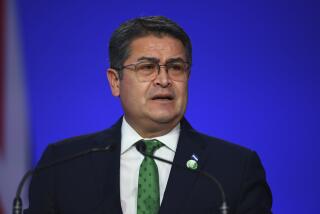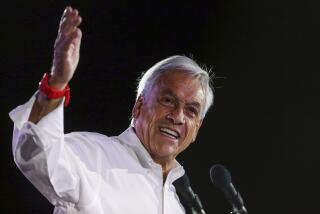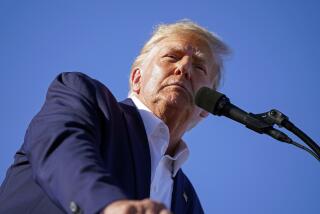Pinochet Loses Immunity in Abuse Case
- Share via
SANTIAGO, Chile — Former dictator Augusto Pinochet can be tried in a case involving alleged abuses at an infamous torture center where Chile’s president-elect was held nearly three decades ago when Pinochet was in power, a court ruled Friday.
Now 90 and ailing, Pinochet is expected to appeal the judicial ruling stripping him of immunity, as he has done in several other cases in which courts have voided his immunity from prosecution. No trial of the former strongman is expected until Chile’s Supreme Court gives the go-ahead.
But the latest ruling, coming five days after Chileans chose as their new president Michelle Bachelet, a former political prisoner in the notorious Villa Grimaldi, highlighted the political transformation this nation of 16 million has undergone since Pinochet stepped down in 1990 and democracy was restored.
Today, Pinochet is fighting to stay out of prison, and one of his regime’s former prisoners -- the daughter of an air force general who died in custody after being deemed a traitor -- has been elected Chile’s first female head of state. Bachelet, 54, will be the fourth consecutive president from the pro-U.S., center-left alliance that has ruled Chile since the dictator’s exit.
Many Chileans have expressed admiration for the lack of rancor shown by Bachelet, who served as defense minister under outgoing President Ricardo Lagos and is popular with the current military establishment. In recent days, medal-bedecked generals and admirals have been among the many dignitaries calling on the president-elect at her home here, many praising Bachelet as part of the extended “military family.”
A major source of speculation is whether Pinochet, whose right-wing regime is said to have been responsible for widespread violence against leftists, including the torture of tens of thousands, will receive a state funeral when he dies. Many Chileans are skeptical that Pinochet, who still has hard-line allies here, will face trial.
Bachelet and her mother were imprisoned at Villa Grimaldi, but their cases are not among the 59 instances of alleged abuses at the detention center that were involved in Friday’s ruling. Authorities are investigating Pinochet’s role in 23 cases of torture and the “disappearances” of 36 other prisoners last seen at Villa Grimaldi.
Pinochet, who is free on bail, is also facing several other human rights cases and charges of corruption in connection with a $28-million slush fund.
Villa Grimaldi, southeast of Santiago, the capital, was among the most notorious torture centers during Pinochet’s 17-year rule, which began when the military overthrew the democratically elected left-wing government of Salvador Allende on Sept. 11, 1973. The Nixon White House was hostile to the Allende regime and secretly bankrolled the Chilean opposition, but denied direct involvement in the bloody coup, during which Allende committed suicide.
Bachelet, a Socialist Party activist, and her mother, 79-year-old Angela Jeria, a staunch Allende supporter, were arrested in 1975 and held for three weeks at Villa Grimaldi and another detention center, Cuatro Alamos.
Pinochet’s security forces sometimes referred to Villa Grimaldi as the “palace of laughter,” Human Rights Watch noted in a report on the former interrogation facility, which has been converted into a visitor center.
The president-elect has said she and her mother were physically mistreated, but she has avoided going into detail and said her mother suffered much worse treatment than she did.
After being freed the pair went into exile, first to Australia and later to what was then East Germany, which was home to a large Chilean solidarity movement. Mother and daughter returned to Chile in 1979. Bachelet, a pediatrician and mother of three, was for years able to find work only in a small private clinic in Santiago because of her left-wing background.
Bachelet’s father, Alberto, called a traitor because he aided Allende’s regime, was arrested and tortured by Pinochet’s forces after the coup. He later died of a heart attack, which his daughter attributes to the abuse he endured. Bachelet was very close to her father. In her emotional victory speech Sunday, she said she felt his presence as she and thousands celebrated the election of a female head of state.
“Violence entered my life, destroying that which I loved,” Bachelet told the crowd. “Because I was a victim of hate, I have dedicated my life to rejecting that hate and converting it into understanding and tolerance.”
*
Times special correspondent Eva Vergara contributed to this report.
More to Read
Sign up for Essential California
The most important California stories and recommendations in your inbox every morning.
You may occasionally receive promotional content from the Los Angeles Times.










